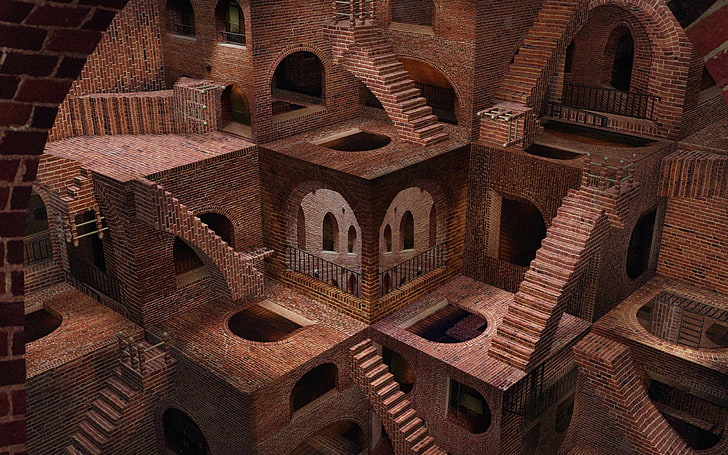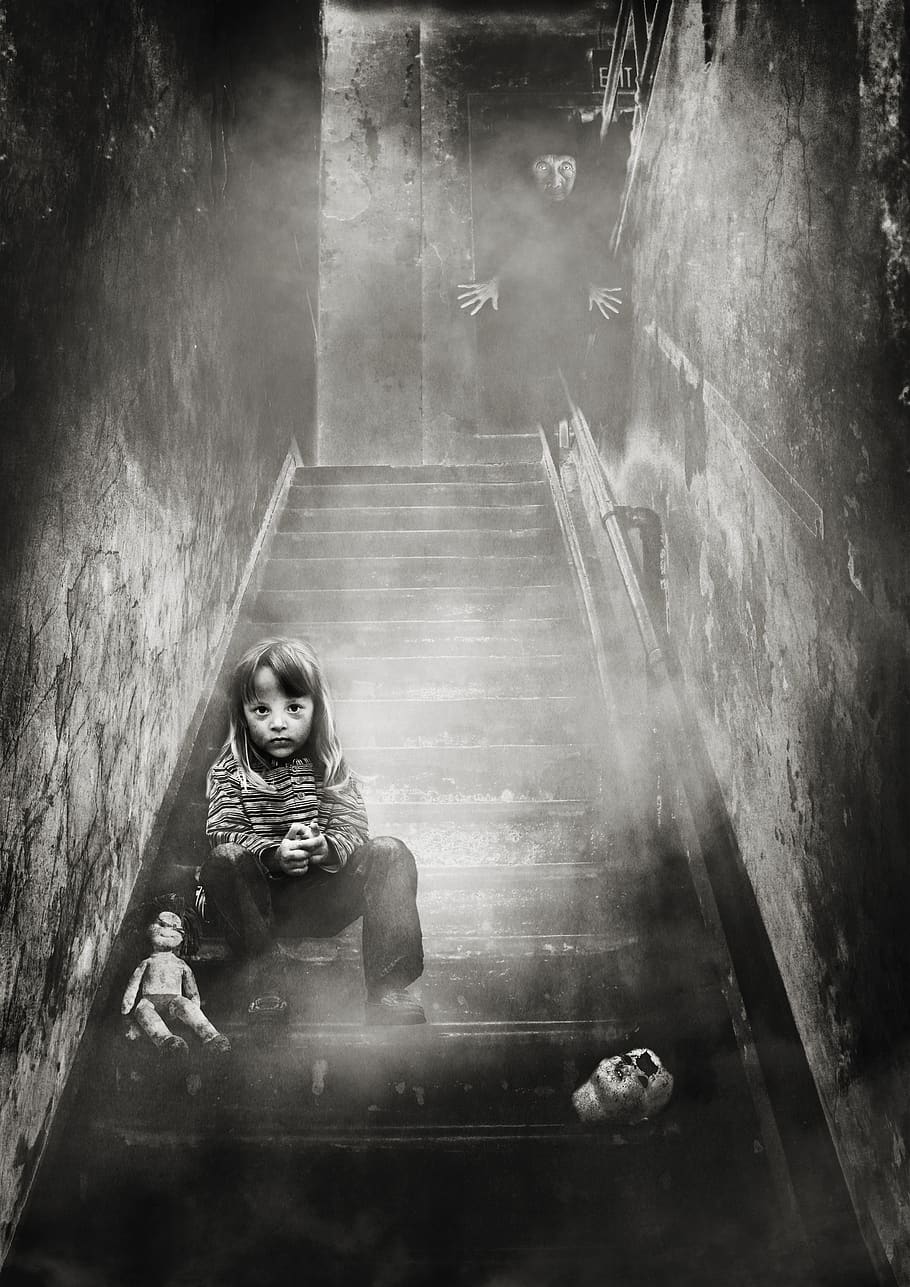Spirit, Learning and Life
Forming character through the insights of literature, contemporary culture and Scripture.
Catch Me If You Can
by Arthur Paul Patterson
MY INNER CHILD has the pernicious habit of throwing himself down the stairs. This behaviour began one evening during the winter of '56 when I climbed the stairs up to the second story washroom in our Berry Street home. Being only four years old, I was not steady on my feet. The excitement of going to the Ice Capades coupled with the urgency of nature's call and the staccato voice of Danny Gallivan calling the hockey game between the Leafs and the Habs, contributed to my imbalance. The cotton socks that adorned my pudgy, short feet often snagged on the copper moldings of the hardwood stairs. This night was not a time for snagging. I made it to the top uneventfully. Relief was soon to come, then I'd be off to somewhere exciting.

All images from wallpaperflare.com
Instead of relief, however, I encountered horror at the top of the stairs. Whether it was too many Twilight Zone episodes, or last Friday's physical encounter with an unstable Christmas tree, I became hysterical as my hand felt the cold, clammy texture of a monstrous appendage on the bannister. Normally the second floor was a place of solace to me. Stories of Scottish folk heroes recited by my grandmother and Bible legends assured me of absolute security there on the second floor. But on this night the familiar had been transformed into a phantasm that equalled any of Edgar Allan Poe's.
Whether it was the scream or the fingernails digging deeply into the wood that came first I don't recall, but a decision was made that split second. The appendage was undoubtedly attached to the white outline of a man whose sole intention was to ingest me or frighten me to death. There was no time for a reasoned descent down the stairs. "Jump or be eaten!" This was the dictate of child logic.
I can't remember deciding but I do remember where I found myself right after the fall. I lay at the bottom of the stairs sobbing more from fright than from the inevitable bruises that accompany jumping down a flight of wooden stairs. I also remember the commotion coming from the living room as the adults came to see what I had done to myself this time. In sentences that stumbled over one another I told them of a monster, its reality, my choice and the pain in my shins.
In comforting tones they responded, as adults usually do in times like these, with denunciations of the existence of monsters and rational explanations of what really happened. I was impervious to their clear-minded testimony. They were forced to exhibit the physical evidence. Squirming at the end of my father's outstretched arm, I arrived again at the top of the stairs. The light bulb burned brightly in the hall revealing no white shriveled man, only a coat rack with my mother's white sweater draped across it. The telling evidence dangled from my father's fingertip. Here was a dripping, pink terri-towel cloth, which on closer inspection smelt of Noxema hand lotion. My father said with a smile, "Her skin gets dry in the winter, Paul. She leaves this stuff all over the house."
POWER OF IMAGINATION DENIED
At first I wanted to accuse Dad of planting evidence to discredit my story. But even at the age of four I realized that they would have had to walk past me to get all that stuff up there without me noticing. Fear may have clouded my reason but the adrenalin heightened my senses and the possibility of my parents carting the sweater rack and a Noxema smeared face- cloth without me noticing was too much. My child logic reluctantly conceded to adult reason. I imagined the whole thing.
If I had known then what I know now, I would have paid a bit more attention to the "falling down the stairs" scenario. Since then I have learned that the imagination of a child far outweighs the logic of the adult in the formation of character. When I gave in to adult logic, I lost the transforming power of imagination. Instead of honoring my fears, I learned to discount, reduce, and deny them. The objective facts of the white sweater on a hanger and a flesh-colored wet cloth on the railing need not have cancelled out the subjective truth of the ghostly apparition. But they did.
Because I have not believed in him, I've been crippled by the shriveled boy-eating man on the stairs. When I think of the many times I have been elated by the possibility of rising above constriction and boredom only to encounter the irrational fear of change, I cannot help but dimly envision his dull white outline. Those childhood feelings were there but I no longer had the child's courage to cry, "Ghost!" Instead, I became mute and paralyzed. I looked for some rationalizing explanation for the fear in my heart.

His white outline followed me through grad school and on into my career. When my spiritual beliefs changed, I lingered too long in my security as a minister in a conservative religious culture. I thought the changes would admit the ghost back into my life. Like a frightened child I acquiesced to adult logic. I mouthed verbal consent to things that I did not experience but were sanctioned by the collective. My imagination was cramped in a small belief system. I didn't have the courage to take the next few essential steps. I became an awkward Jacob tumbling down the ladder of insight instead of learning how to experience my fears. I was definitely a stair diver.
WHITEMAN REVISITED
The damp moss under my hiking boots gives way as I struggle up the escarpment at Petroglyph Park near Nanaimo, British Columbia. Lucky for me, I quickly spot a nearby ledge to land on a few feet below. A low bough of an arbutus tree lashes the side of my head as I tumble toward the security of the ledge. I make it. My head rings as my feet find a foothold in a dark crevice. I look down into the gully far below; I realize that this is no time for diving. Wherever I am, I'm here for a while until I get myself together enough to complete the ascent. Feeling woozy I rest.
Dazed and gazing into the dark crevice I hear a brittle crumbling of dry rock and feel in the pit of my stomach a grinding, rotating sound just beneath my feet. Whiteman has come for me. I see his fingers protruding from the crevice, the cracks in his rubbed, red hands seem deeper than those in the rock itself. I have found my safety on this ledge but I also find my fear here. Safe from the fall, afraid of what is stuck in the crack, I make an instant decision. I will confront the old Boy Eater. In fact, I find my hands involuntarily slipping beneath my boots into the crevice to grasp the ugliness below. I heave; he ascends swiftly. Like quicksilver his body pours out of the crack and reconstitutes itself before my eyes. I sense his shame as my unbelieving eyes scan him cautiously. I feel as if I am about to blackout. I touch my head gently to assure myself that this is not the apparition my adult logic assures me it is.
With an economy of words, Whiteman cuts to the quick and dryly moans, "You have ignored me for such a long time. I have exhausted myself in trying to make my way to your surface. You will have to forgive my appearance. We need not draw this out. We need to speak plainly to one another's heart."
As hideous as he appears his conversation exudes sadness and love. I know that these moments matter and have great consequence. I remind myself that I must be absolutely honest as I speak to him.
"I would like to get to the heart of the matter but I feel I must at least acknowledge my feeling toward you. When I look at your outer appearance, I realize that you are the very fabric of fear that I have worn throughout my life. I have never seen you as I do today but I am familiar with you, as familiar as with my body's cells."
He doesn't have to say it. I know that my excursus is designed to avoid his message. He smiles.
HIDE AND SEEK
"Yes, I am close to you, so close that it takes imagination to see me. It is the only way but enough explanation!" His brow furrows deeply auguring that the conversation is about to deepen. Sitting on his hip, he pivots and leans toward me intently.
"I am who I am. You may think of me as Death, God, Demon, Angel, Shadow or even Dream. It is irrelevant. I move upon you. Your mind only scans the surface of who I am. Definition aside, I want you to know that I seek your liberation and I want you to grow toward compassion.” I feel his sincerity and am humbled by the sheer energy of his presence. An honest question is catapulted into the discussion.
"Whiteman, if you are so sure of your identity, of the integrity of your own existence, then why do you seem so full of shame, so sorrowful? Why do you insist on hiding from me even as I hide from you?" Heart in throat, I await a reaction. Instead, the atmosphere becomes clear, more honest. Whiteman softens at my side. As he speaks his crusty skin appears more porous and moist.
"We play hide and seek. Remember both the fear and the exhilaration of being caught. Remember the palpitation of your heart as you touched your friend and ran for home. Do it purposefully, not to avoid but for a higher goal. What you read as shame on my face is humility and the shyness that befits one so aware of the intimacy of the Game."
"You mean to say that we can play the game in a conscious manner? I have never thought of that before. 'Cat and mouse', 'Catch us if you can', or whatever childhood phrase we use can be played seriously and to good ends? I have always thought it not only unconsciously irresponsible but immature and escapist to hide, to playfully conceal." Where did I get the idea that playfulness is irresponsible and immature? Why is the subtle, intangible and fantastic escapist?
Overhearing not my outer but my inner dialogue, Whiteman responded, "Your imagination was murdered in that tumble down the stairs. Murdered by a lack of courage and the need to protect yourself from the terror of love through logic. Had you honored your child's instinctual wisdom you would have found at the center of your frightening experience a Lovers' Game calling you to devotion, courage, trust and imagination. The heart of the matter is that you do not climb stairs to be healed, changed, succeed or be saved. Your adult logic ruthlessly denies the importance of the child's imagination but it is never too late for the playful Lover of the Game to learn the lesson. Will you play the Game and go the way of the imagination?"
With this he reached out and touched me. His parting words reverberated as if I were in an ancient temple. He simply said, "You're It." With this I knew the terror and the joy of the Game were finally mine.
For further reading on the use of the imagination, see:
We've Had a Hundred Years of Psychotherapy and the World's Getting Worse by James Hillman and Michael Ventura
Care of the Soul by Thomas Moore
At a Journal Workshop by Ira Progoff.
